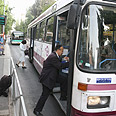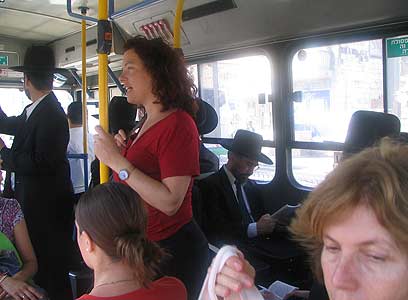
Segregated bus (archives)
Photo: Anar Green
Women protest gender-segregated buses
Dozens of people, mostly women, ride on 'mehadrin' buses in which men and women sit separately and sit at front of bus in protest. Protesters demand an end to discrimination that forces women to sit at back of bus for modesty reasons. Protesters make sure to respect religious ban on coming in physical contact with opposite sex
The protest against gender-segregated bus lines stepped up. Dozens of protesters, mainly women, rode en masse on buses labeled 'mehadrin lines' in Jerusalem in which women must sit at the back of bus out for modesty reasons.
"We are acting as responsibly as possible. We instructed all our male and female activists to act respectfully and to dress appropriately," said Ella (Academia without Harassment) Spokesperson Shiran Dadon. "We instructed all of our activists not to sit next to bachelor yeshiva students and for men not to sit next to women out of respect of their desire not to come in physical contact with the opposite sex."
Under the banner "Free transportation day – putting an end to discrimination in public spaces," the protesters flocked early in the morning on Sunday to 'mehadrin line' bus stops. When the buses arrived, they sat in the men's section at the front of the bus. The protesters, among them members of city council Laura Wharton and Rachel Azaria, wore red bracelets on their wrists as a sign of their protest and distributed to the passengers information booklets against the controversial separation between the sexes.
Segregation
Haredi women sick of sitting in back of segregated buses, file a petition with High Court to change situation
"We are not fighting against the haredi community or against Jewish religion, but against the scheme 'to hide' women under the robe of 'modesty.' We act with the most possible sensitivity, but also with the necessary determination in order to fight against the severe physical and verbal shows of violence that women are subjected to on these bus lines on a daily basis," explained Dadon.

Women protesting on the bus (Photo: Roy Elman)
Contrary to expectations, the protest did not provoke a violent response from the haredi public. Except a few shouts and threatening glares, no ultra-Orthodox passenger tried to forcibly block the women from sitting at the front of the bus. On one of the buses, a haredi passenger approached the driver to complain about the women sitting in the men's section of the bus, asking that the driver instruct her to move to the back. The driver ignored the request and kept on driving.
The 'mehadrin lines' started running a number of years ago in response to demands made by the haredi population. The Egged bus company responded to the request and has ever since operated a number of such lines in Jerusalem. The bus lines very quickly became a new source of friction between seculars and haredim.
In recent months, there have been an increasing number of reports of violence against secular people, mostly women, who rode on the 'mehadrin lines' and refused to sit at the back of the bus.
The fight against 'mehadrin lines' was initiated some two years ago when the Reform movement's Israel Religious Action Center petitioned the Supreme Court to shut down the lines. Public protest against the lines has recently been renewed following the convening of a special committee within the Transportation Ministry slated to discuss legalizing segregated bus lines.















